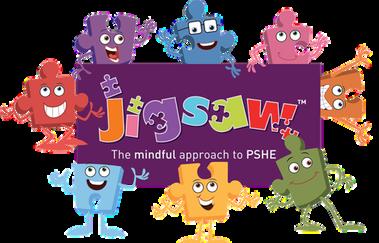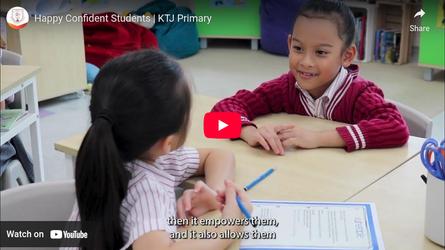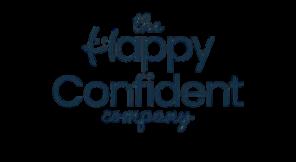
Early Years Curriculum Handbook | 2025-26










Our curriculum involves activities and experiences to meet the learning and development requirements in the Early Years Foundation Stage (EYFS). The three prime areas of learning and development are:
Personal, social and emotional development
Communication and language development
Physical development
Alongside these are four specific areas, through which the prime areas are strengthened and applied:
Literacy
Mathematics
Expressive arts and design
Understanding the world
The children’s progress is monitored carefully and assessed using the Early Learning Goals which show the level of attainment expected by the end of the EYFS (end of Reception). We share the results of the profile with parents / carers in the final term and provide an opportunity for discussion with their child’s Reception teacher.
We also use 4 schemes of learning to help support some of the 7 areas:
Talk for Writing
White Rose Maths
Happy Confident Learner
Our handbook is designed to help you develop a greater insight to teaching and learning in our Early Years classrooms, and how you can support your child at home.

IEYC and Development Matters are two curricula designed to ignite curiosity and foster a love of learning from the very beginning. Through a combination of hands-on activities, exploration, and inquiry-based learning, we aim to support children in developing the essential skills they need to grow into confident, creative, and curious learners.
Development Matters provides a clear progression of developmental milestones in the key areas of learning, including personal, social, and emotional development, communication and language, physical development, and understanding the world. Through activities such as creative play, storytelling, role-play, and group interactions, children begin to develop a deeper understanding of themselves and the world around them.
The IEYC complements this by offering a thematic approach to learning, focusing on both the child's individual development and global awareness through exciting, inquiry-based topics.
Together, the IEYC and Development Matters curricula encourage children to develop independence, resilience, and critical thinking, laying the groundwork for lifelong learning. By focusing on play-based, hands-on experiences, we help children build the confidence and curiosity they need to continue on their learning journey, fostering a love of exploration and discovery.
Both the EYFS and IEYC frameworks are designed to holistically support children's development during the early years, laying strong foundations for a smooth transition into Year 1. Each curriculum emphasises key skills that are essential for success in more formal learning environments. As children move into Year 1, they are well-prepared not only academically, but also socially and emotionally, enabling them to confidently engage with the increased structure and expectations of the next stage in their educational journey.

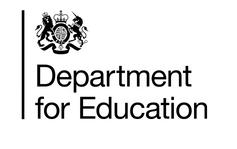

At the start and conclusion of each unit, we invite parents to join us at school to learn more about the topics their child’s year group is studying. These sessions, known as Entry and Exit Points, offer numerous benefits, such as enhancing home-school partnerships, providing a glimpse into upcoming learning experiences, and celebrating the progress made. They are always well-attended by parents, who also appreciate the chance to connect and chat with other families.
Class teachers provide parents with full details of these events throughout the year.
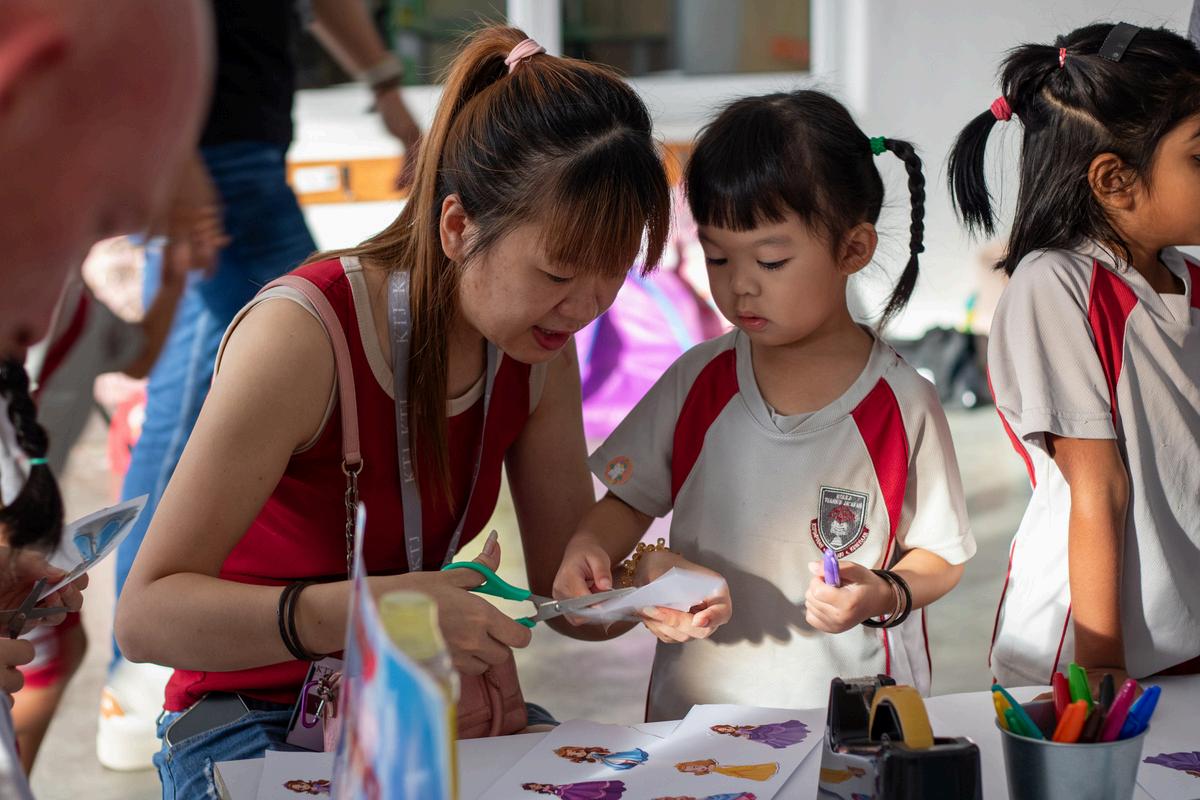
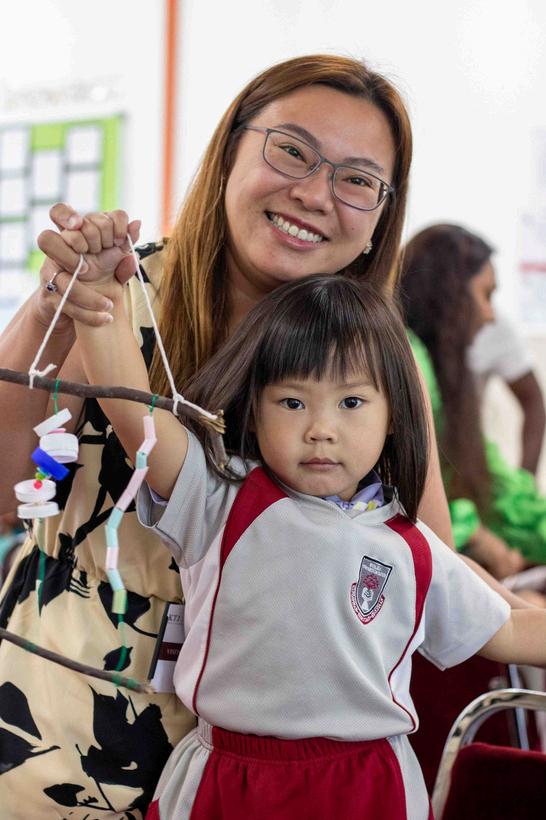
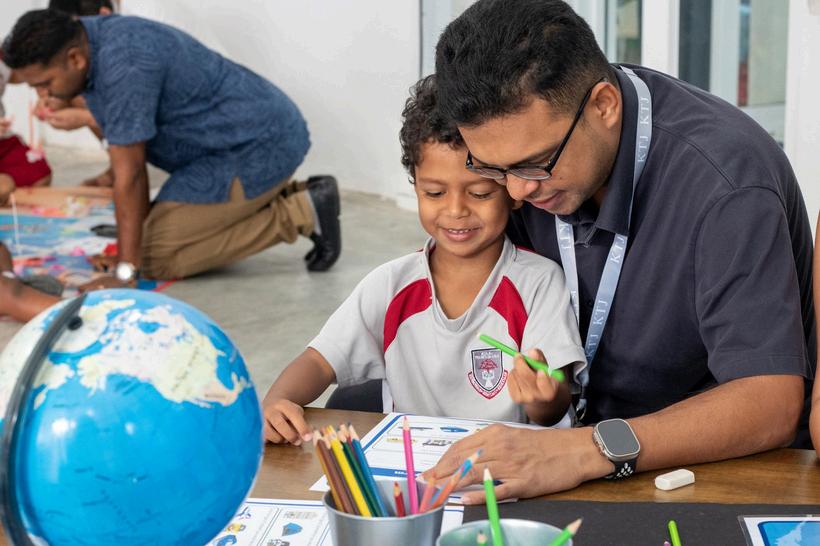

Our English curriculum in Early Years is designed to ignite a love of reading, writing, and communication from the very start. Through fun, engaging activities and a structured approach to developing skills, we aim to nurture confident, curious, and expressive young learners.
In Early Years, the focus is on building strong foundational literacy skills. Pupils are introduced to phonics, helping them to understand the sounds letters make and how these sounds come together to form words. They also explore basic concepts of spelling, grammar, and sentence structure, providing them with the essential tools to begin reading and writing confidently. A variety of stories and texts are shared, helping children develop an understa tory structures.
Speaking and listening skills are fostered through activities such as storytelling, role play, and group discussions, encouraging children to express their ideas and communicate effectively with others. By the end of Early Years, children will have a solid foundation in literacy that prepares them for the next steps in their learning journey.
Overall, our English curriculum fosters essential literacy skills while also cultivating a lasting passion for language and a love of learning.
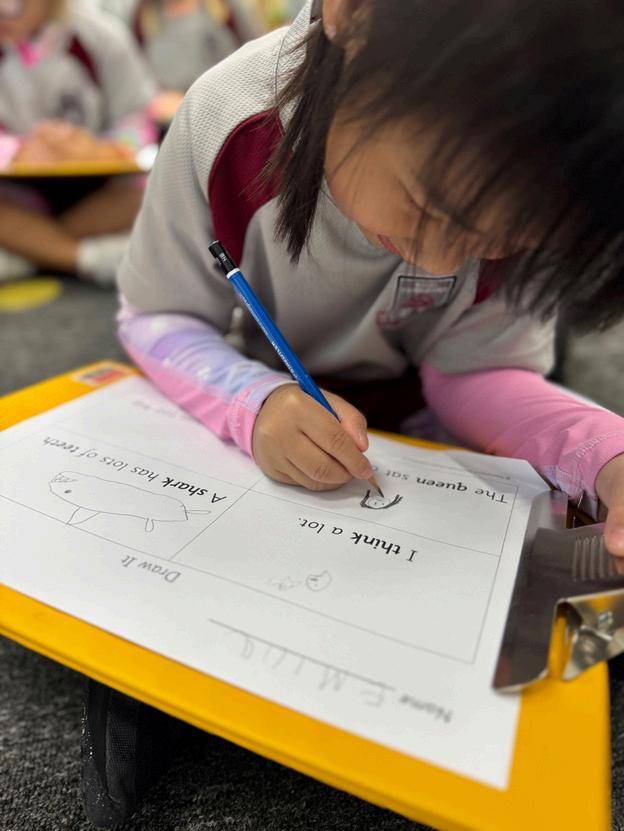

Sound!Start Phonics, a leading scheme from the United Kingdom, builds on the foundational skills developed in our Early Years classrooms. There is no doubt the English language is creative and complex. Therefore, we focus on what we want children to learn and remember.
We aim for children to understand the sounds used in the English language and how letters represent these sounds. They also need to master blending sounds to form words and segmenting words into individual sounds for reading and writing. We also introduce the children to a variety of tricky words that they have to remember from memory.
The more children read books, the more confident they will become with English, phonics and early reading. Books are carefully selected to match your child’s phonics ability. Each day your child will have the opportunity to read this in school.
Guided Reading is split into four parts and each day your child will learn at a different station:
Decoding
Independent reread
Comprehension
Book Browsing
Your child will read the same book each for each of these sessions, then a new book will be provided so the cycle can start again.
For children to maximise their skills in reading fluently in English, we need your help at home! Please read each evening with your little one!
At KTJ, we use the Talk for Writing approach to help our Early Years students become confident and creative communicators.
Talk for Writing encourages children to explore language through speaking, listening, and playful activities before they begin writing. By engaging in storytelling, role-playing, and discussions, children internalise the structures and vocabulary of stories and simple texts, which they can then apply to their own creative writing. This approach helps to improve not just writing skills, but also boosts creativity, communication, and confidence in expressing ideas.

You play a crucial role in supporting your child's literacy development in the early years by engaging in simple, everyday activities. These include:
1. Reading together: Read books aloud to your child regularly, discussing the pictures and asking questions about the story to boost comprehension.
2. Talking and listening: Engage in conversations, encourage storytelling, and listen actively to help develop vocabulary and language skills.
3. Building phonics awareness: Play games with rhyming words, and help your child recognise sounds and letters through playful activities.
4. Writing activities: Encourage your child to draw and write, even if it’s just scribbles, to help them build fine motor skills and understanding of written symbols.

Our mathematics curriculum in Early Years is designed to spark a love of numbers, problem-solving, and exploration from the very start. Through engaging activities and a structured approach to developing mathematical skills, we aim to nurture confident, curious, and capable young learners.
In Early Years, the focus is on building a strong foundation in number sense and basic mathematical concepts. Learners are introduced to numbers, shapes, and simple patterns, helping them to understand how numbers work and how to solve basic problems. They explore concepts such as counting, addition, and subtraction, laying the groundwork for more advanced mathematical thinking.
Practical activities and hands-on experiences are used to develop children's understanding of measurement, size, and comparison. These activities help them make connections between numbers and the world around them.
Through activities like number games, puzzles, and group discussions, we foster problem-solving skills and encourage children to think critically about numbers. By the end of Early Years, children will have a solid foundation in mathematics that prepares them for the next steps in their mathematical journey.
Overall, our mathematics curriculum not only develops key numeracy skills but also cultivates a love for numbers and a curiosity for learning.

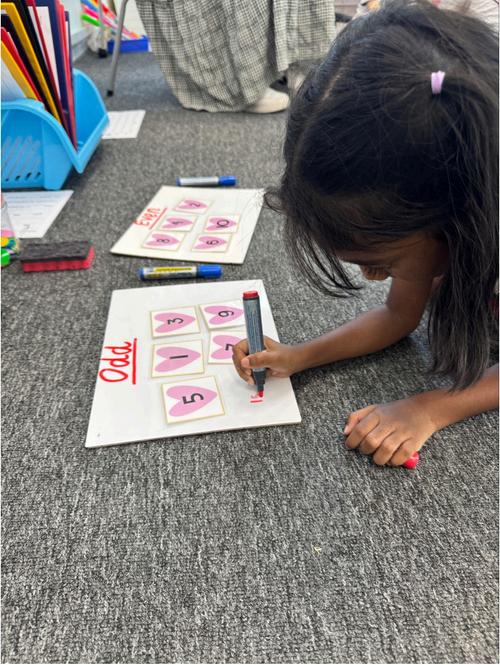
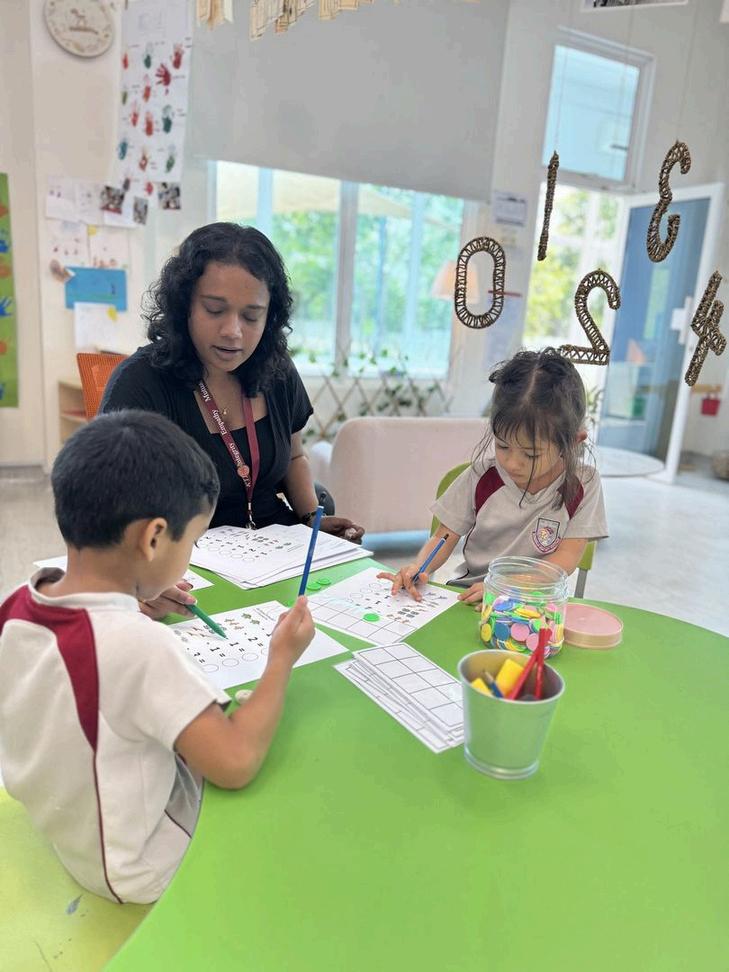
At KTJ Primary, our approach starts with building a strong foundation in number sense and basic operations, progresses through the White Rose Maths framework, and our adaptive teaching strategies encourages deeper exploration through practical problemsolving and reasoning.
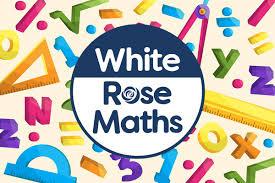
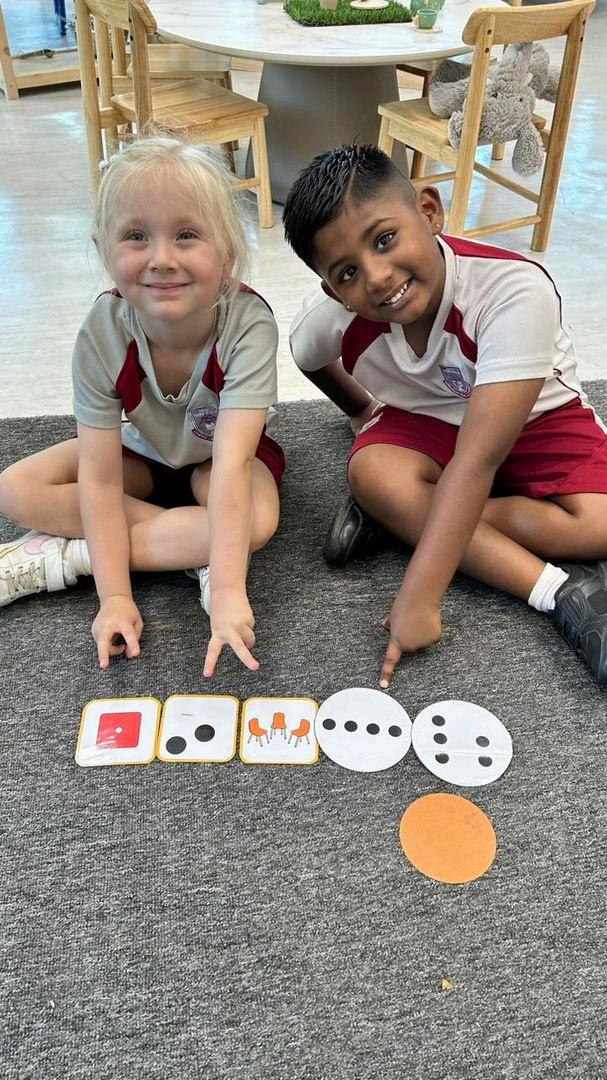
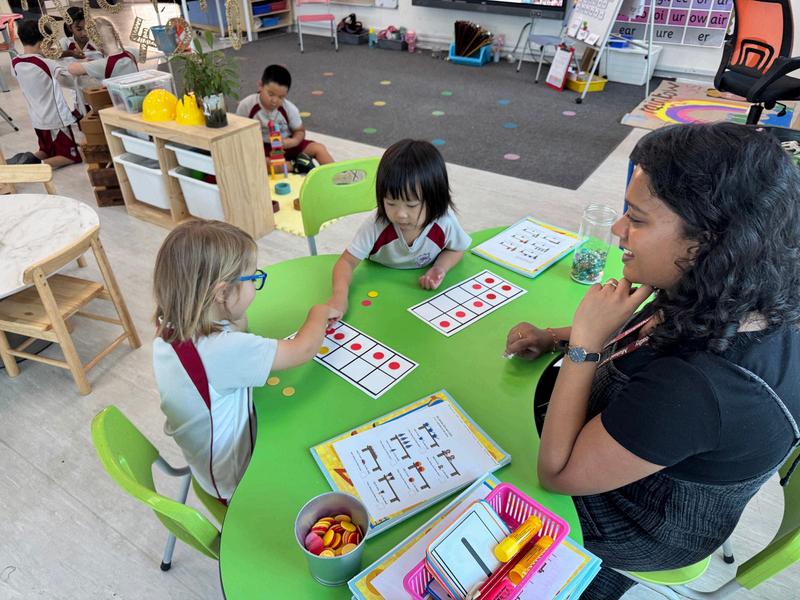

You play an essential role in supporting your child’s mathematical development in the early years by engaging in simple, everyday activities. These include:
1. Counting together: Count objects around the house, such as toys, steps, or pieces of fruit, to help your child develop number recognition and counting skills.
2. Exploring shapes: Point out different shapes in the environment, whether it's the roundness of a clock or the square corners of a table, to help your child recognize shapes and understand their properties.
3. Creating patterns: Make simple patterns with toys, blocks, or even with clothing and encourage your child to continue or repeat the pattern.
4. Measuring: Use items like spoons, cups, or blocks to compare sizes, lengths, and weights, making measurement fun and interactive.

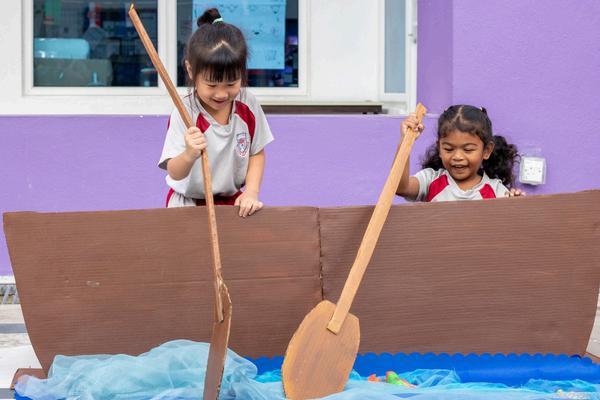

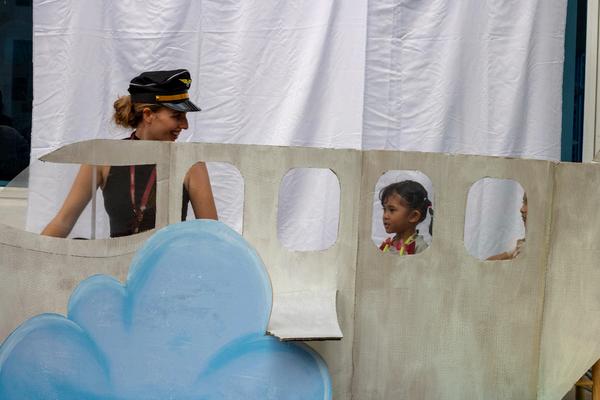
Understanding the World curriculum in Early Years is designed to spark curiosity about the world around us and foster a sense of wonder in young learners. Through hands-on activities and exploration, we aim to nurture confident, inquisitive, and thoughtful children who are eager to learn about the environment, people, and cultures.
In Early Years, the focus is on developing an understanding of the natural world, the people and communities around them, and how things work. Learners explore concepts related to science, geography, history, and technology, with opportunities to observe, question, and investigate their surroundings. They learn about different living things, the weather, changes in the seasons, and the environments that exist beyond their own.
Through activities such as observing plants and animals, exploring simple technological tools, and learning about different cultures, children begin to make connections between the world and their own experiences.
Through discussions, stories, and hands-on exploration, children develop a deeper understanding of how people live, work, and play, both locally and globally. By the end of Early Years, children will have a solid foundation in understanding the world around them, preparing them for further exploration and discovery.
Overall, our Understanding the World curriculum encourages a love for exploration and helps children develop a lifelong curiosity about the environment and the diverse world in which we live.

We place a strong emphasis on scientific inquiry, encouraging students to ask questions, make predictions, take part in experiments, and explore results. It gives the children the opportunity to become real sensible scientists, as a result of which this develops their critical thinking, problem-solving, and reasoning skills. We are able to draw on the practical experience and make it fun for children. Please see below for some activities we do in school:
This activity allows children to explore the strange properties of this cross between a liquid and a solid. For best results use a large shallow container that you can put on the floor, like a sand/water tray. Mix together cornflour and water until you have a slime consistency. Try punching the slime – it instantly turns solid. Roll some slime into a ball in your hand and then stop – it turns back into a liquid.
For this activity – an engaging introduction to chemical reactions – you’ll need a shallow dish, full-fat milk, food colouring, cotton buds and washing-up liquid. Pour some milk into the dish, add some drops of food colouring, then dab with a cotton bud dipped in washing-up liquid.
Use a few different colours at the same time for maximum impact, and try dabbing in different places.

You play an important role in supporting your child’s understanding of the world by exploring the environment together and encouraging curiosity. These include:
1. Exploring your community: Take walks around your neighbourhood or visit different places to help your child understand the people and places around them.
2. Talking about nature: Observe the weather, seasons, and wildlife together, discussing the changes you see and how things grow and change over time.
3. Using technology: Allow your child to explore simple technology tools, such as tablets or educational apps, while guiding them in using these tools in a safe and productive way.
4. Caring for the environment: Involve your child in activities like recycling, gardening, or caring for pets, helping them understand the importance of taking care of the world around them.

Our Expressive Arts and Design curriculum in Early Years is designed to ignite creativity, self-expression, and imagination. Through a variety of art, music, dance, and design activities, we aim to nurture confident, imaginative, and expressive young learners.
In Early Years, the focus is on encouraging children to explore and experiment with different materials, tools, and techniques. They are introduced to drawing, painting, sculpture, music, and movement, giving them the opportunity to express their ideas and emotions in a variety of ways. Children also begin to develop an understanding of colour, shape, texture, and pattern, building foundational skills in both visual and performing arts.
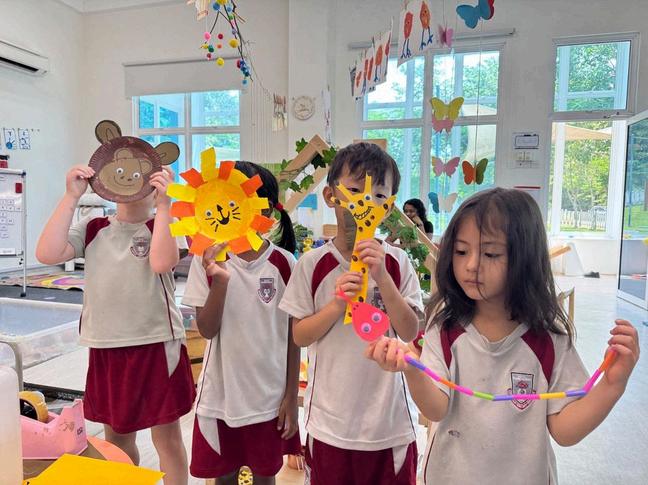
Through hands-on activities such as role play, constructing models, singing, and dancing, children learn to communicate their thoughts and feelings creatively. They are encouraged to think outside the box, make connections, and develop their own artistic style.
By the end of Early Years, children will have had opportunities to explore different art forms and gain confidence in expressing themselves. Our Expressive Arts and Design curriculum fosters a lifelong appreciation for creativity, providing children with the tools to communicate through art and design in meaningful ways.
Our expressive arts and design curriculum, in line with the EYFS framework, supports children in developing their creativity, imagination, and confidence. It encourages them to explore a wide range of materials and media, and to express their ideas, thoughts, and feelings through art, music, movement, and role-play.

You can support your child’s creativity and artistic development at home by encouraging exploration and expression through everyday activities. These include:
1. Art activities: Provide a variety of materials like crayons, markers, paper, or clay, and allow your child to create freely, offering opportunities for both guided and independent artwork.
2. Music and movement: Sing songs together, explore different instruments, or have fun dancing to different rhythms to help develop their musical and rhythmic abilities.
3. Imaginative play: Encourage your child to engage in pretend play with costumes, props, and storytelling, allowing them to explore different roles and scenarios.
4. Design and build: Provide simple materials like blocks, recycled items, or fabric to help your child design and create their own structures, fostering problem-solving skills and creativity.

Our Physical Education (PE) curriculum in Early Years is designed to promote physical development, coordination, and a love for movement. Through a range of engaging activities, we aim to nurture confident, active, and resilient young learners. In Early Years, the focus is on encouraging children to explore movement, develop balance, and build strength through fun and interactive activities. They are introduced to basic skills such as running, jumping, throwing, catching, and dancing, giving them the opportunity to develop both fine and gross motor skills. Through play, children learn about space, teamwork, and the importance of being active. Hands-on activities such as obstacle courses, games, and group activities help children build coordination, flexibility, and body awareness. They are encouraged to work with others, take turns, and communicate effectively during physical activities, helping to develop social and emotional skills as well.
By the end of Early Years, children will have a solid foundation in physical activity and will feel confident in their ability to move, play, and participate in sports. Our PE curriculum fosters a lifelong love of physical activity, helping children develop healthy habits and an appreciation for being active.
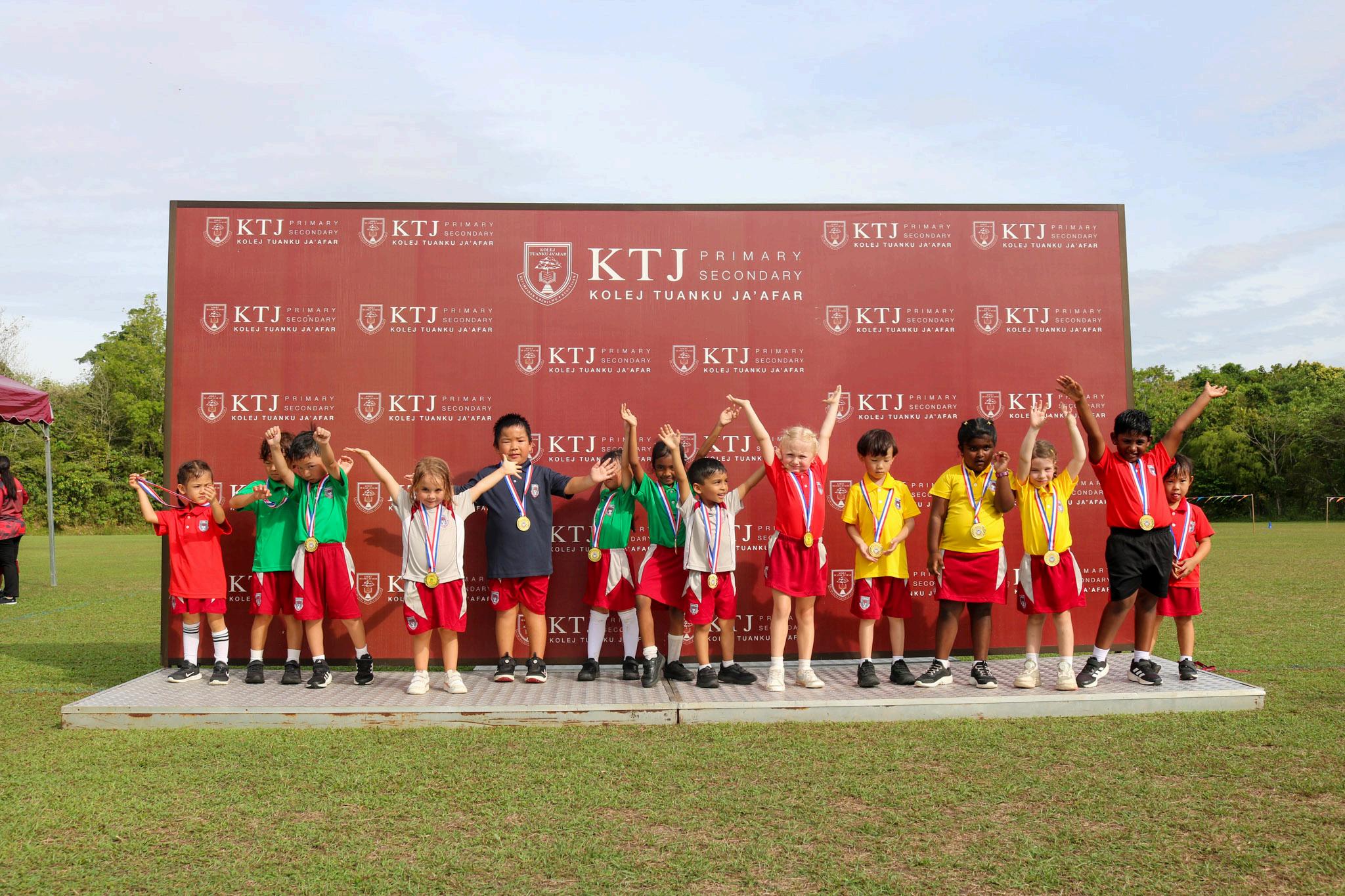

Below is a list of activities that our children can participate in:
Spatial awareness games
Games with specific and changing rules
Explore different types of movement
Coordination activities; dribbling, beanbag toss & freeze ball
Balance: Use balance boards or simple activities like walking on a line to improve stability
Gymnastics: basic Tumbling: Introduce simple rolls, somersaults, and stretches to build flexibility and strength
Dance & Rhythm
Apparatus: jumping and Landing: Use mats for safe jumping activities, teaching proper techniques for take-off and landing
Core Strength & Stability
Obstacle Courses: Set up simple courses with tunnels, cones, and balance beams to help children develop coordination and gross motor skills
Yoga and Mindfulness
Throwing and Catching
Kicking and Passing
Batting and aiming (beach ball, ping pong, tennis, cricket)
Sporting games
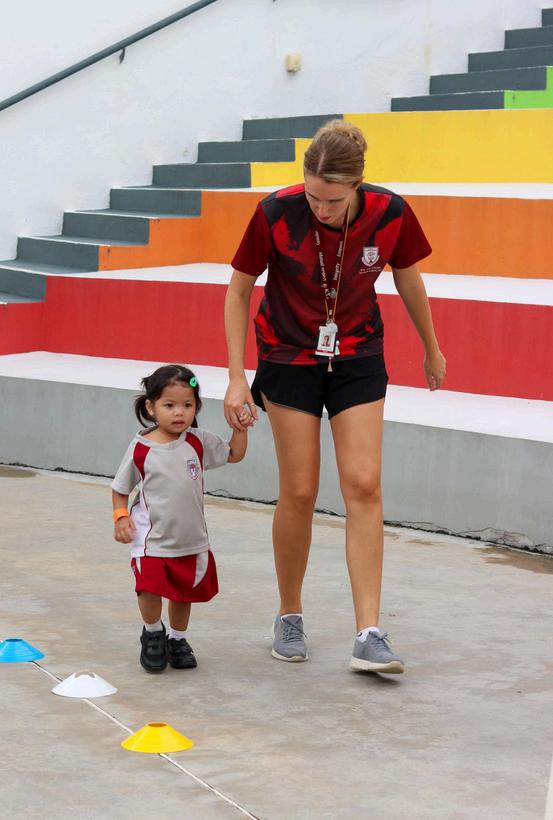
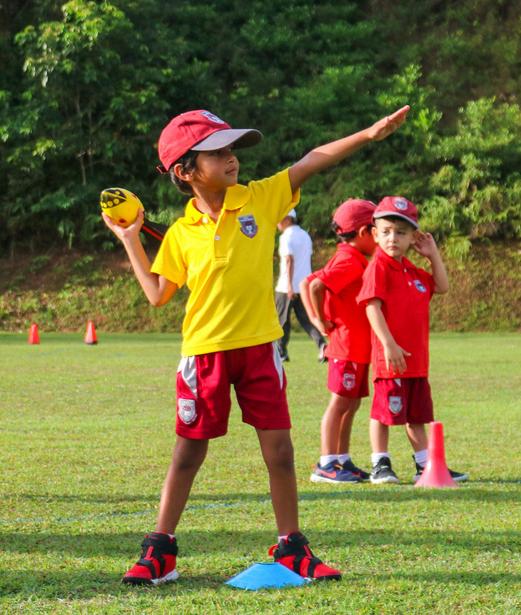

You can support your child’s physical development and active lifestyle at home by encouraging movement, coordination, and fitness through everyday activities. These include:
1. Active play: Encourage your child to engage in activities such as running, jumping, or playing tag. Simple games like "Simon Says" or "Follow the Leader" can help develop their coordination and balance.
2. Fine motor skills activities: Provide activities that involve using hands and fingers, such as building with blocks, drawing, or doing puzzles. These activities help improve hand-eye coordination and fine motor control. Encourage your child to hold the pencil in a tripod grip to improve writing.
3. Dance and play: Play music and encourage your child to dance, creating fun routines or simply moving to the rhythm. This supports their balance, coordination, and musical awareness.
4. Outdoor exploration: Take your child outside for nature walks, bike rides, or to visit a park, where they can practice physical skills like climbing, balancing, and running. These experiences help develop strength, stamina, and spatial awareness.

Our Swimming curriculum in Early Years is designed to support water confidence, physical development, and a positive attitude toward swimming and water safety. Through fun, age-appropriate activities, we aim to help children feel comfortable and capable in the water.
In Early Years, the focus is on building water confidence and familiarising children with basic aquatic movements. Children are gently introduced to skills such as floating, kicking, blowing bubbles, and submerging their faces in water. These early experiences help to develop coordination, body control, and breath awareness in a safe and supportive environment.
Through playful games and guided water activities, children begin to understand how their bodies move in water, learning key concepts like buoyancy, balance, and movement. Sessions often involve songs, imaginative play, and the use of flotation aids to ensure swimming is enjoyable and engaging for every child.
Group swimming activities also encourage important social skills such as listening, following instructions, and supporting one another. Children learn about pool safety, personal responsibility, and the importance of staying calm and confident in and around water.
By the end of Early Years, children will have a strong foundation in water confidence and basic swimming skills. Our swimming curriculum fosters a sense of achievement and builds the skills necessary for further progression in swimming. Most importantly, it instills a lifelong respect for water and a love of swimming.

Below is a list of swimming activities that our children can participate in:
- Water Confidence Games: Splashing, water play with toys, and getting comfortable with water on the face and body.
- Blowing Bubbles: Practicing breath control by blowing bubbles in the water.
- Floating Skills: Using floatation aids to learn back and front floating.
- Kicking Practice: Holding the poolside or using a kickboard to develop strong, coordinated leg movements.
- Arm Movements: Basic paddling motions to introduce swimming strokes in a playful way.
- Underwater Exploration: Submerging the face, picking up toys from shallow water, and short underwater glides.
- Jumping In: Safe and supported jumps into the water to build confidence.
- Circle Games: Group activities that involve singing and moving in the water to encourage teamwork.
- Safety Awareness Activities: Learning simple pool rules and practicing safe behavior around water.
- Parachute and Toy Chases: Fun games using floating toys and water parachutes to encourage movement and coordination.
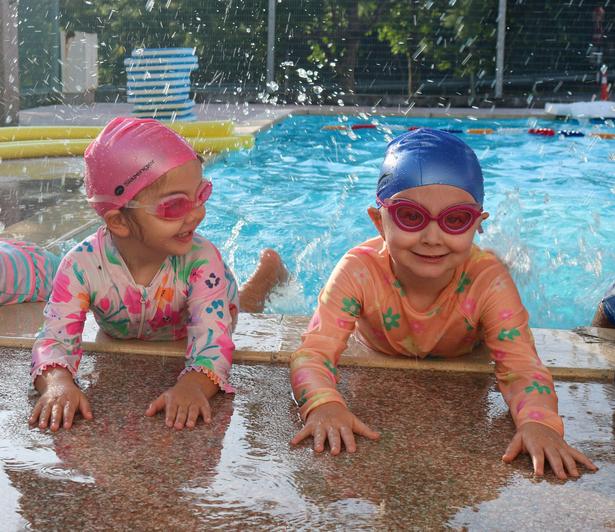
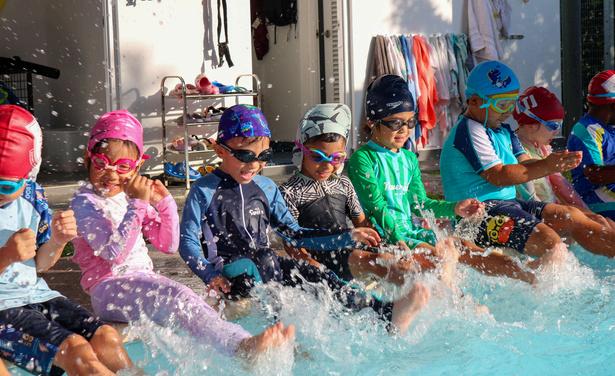
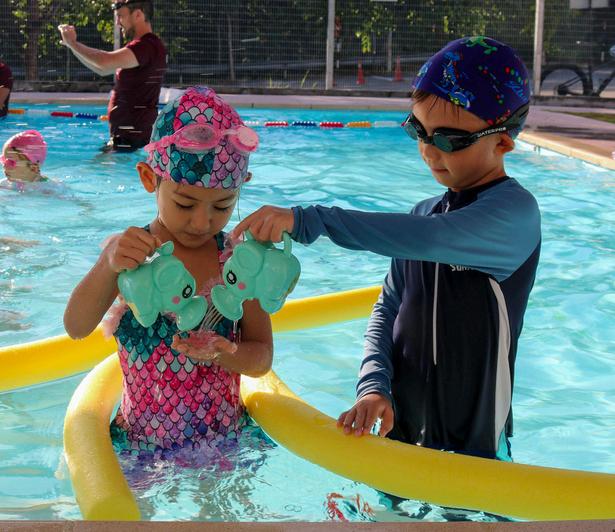

Our outdoor learning program in Early Years is designed to foster a deep connection with nature, promote physical development, and encourage curiosity and exploration in the outdoors. Through hands-on, immersive experiences in a natural environment, we aim to nurture confident, resilient, and independent learners.
In Early Years, our outdoor lessons focus on providing children with the opportunity to explore and engage with nature, developing their physical skills while building an understanding of the world around them. Activities such as tree climbing, building shelters, and exploring natural materials help children develop gross motor skills, coordination, and balance. They also develop problem-solving abilities, creativity, and teamwork as they work together in outdoor tasks.
Children learn about the environment, seasons, and wildlife, while cultivating a sense of responsibility and respect for nature. Activities like outdoor games, nature walks, and storytelling encourage imagination, social interaction, and communication skills. Children are also encouraged to take appropriate risks, developing resilience and self-confidence.
By the end of Early Years, children will have hysical activity, equipped with the skills to explore and enjoy nature in a safe and meaningful wa e of the outdoors, promoting healthy habits, creativity and environmental awareness.
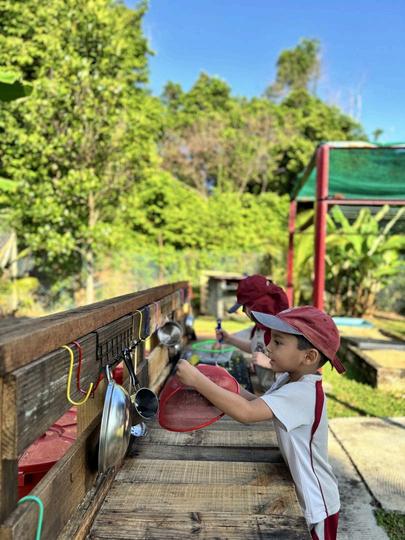
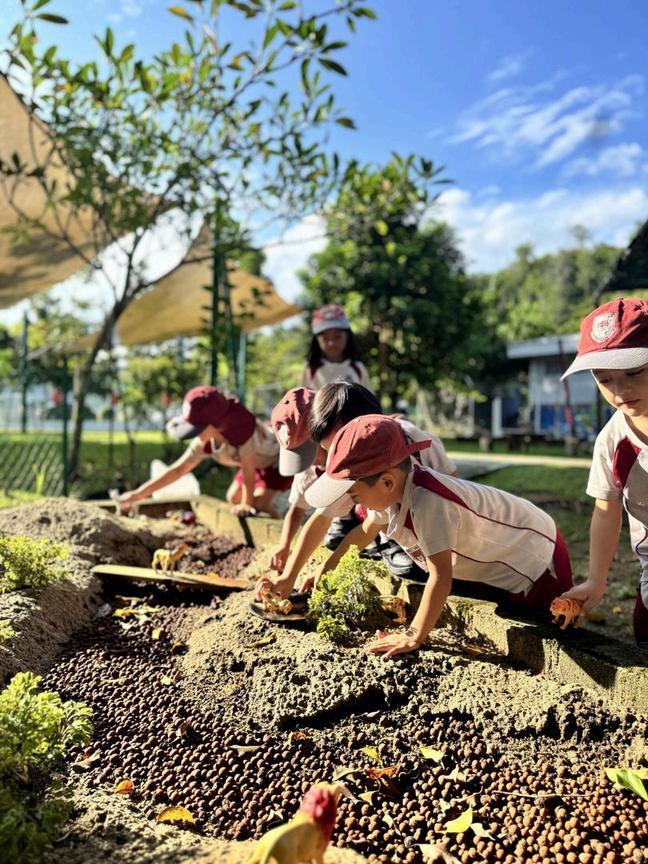


At KTJ, our PSHE curriculum in Early Years is designed to support the emotional, social, and personal development of young learners. We aim to foster a nurturing and supportive environment where children can grow into confident, empathetic, and emotionally resilient individuals. Through engaging and age-appropriate activities, children are encouraged to explore their feelings, develop social skills, and build positive relationships with others.
In Early Years, the focus is on helping children understand and manage their emotions, develop a sense of self-awareness, and build strong communication skills. Activities like storytelling, role-play, group discussions, and collaborative games are integrated into the daily routine, providing opportunities for children to express themselves, understand others, and learn how to work together in a positive and supportive way.
Our approach also emphasises key values such as kindness, respect, responsibility, and empathy. By engaging with stories and characters, children are introduced to different perspectives, helping them develop an understanding of how others might feel and how to respond with care and consideration. Through these experiences, children learn the importance of making good choices and being kind to others, both in the classroom and beyond.
Speaking and listening are fundamental to our PSHE curriculum. We encourage children to share their thoughts and feelings, listen to their peers, and work together to solve problems. These activities help build their confidence, social skills, and the ability to communicate effectively.
By the end of Early Years, children will have a solid foundation in the key areas of PSHE, including self-awareness, emotional regulation, positive communication, and empathy. They will be well-prepared to face the challenges and opportunities of the next stages in their learning journey, equipped with the emotional intelligence and confidence they need to thrive.
Overall, our PSHE curriculum helps children not only develop essential life skills but also foster a lasting sense of well-being and a love of learning.

At KTJ, we use both the Jigsaw and Happy Confident programmes to support children’s emotional and social development.
Jigsaw helps children develop key skills such as emotional awareness, empathy, and understanding of topics like physical health, rights, and responsibilities—all while celebrating each child as a unique individual. This is complemented by the Happy Confident programme, which focuses on self-awareness, emotional regulation, and building strong social connections. Through engaging, interactive activities, children learn to express their feelings, manage challenges, and nurture positive relationships
By incorporating these emotional and social learning elements into daily activities, we help children develop a growth mindset and a strong sense of self-worth, empowering them to face the world with confidence. Children will engage in storytelling, role-playing, mindfulness exercises, and group discussions to support these key skills and enhance their emotional intelligence.
